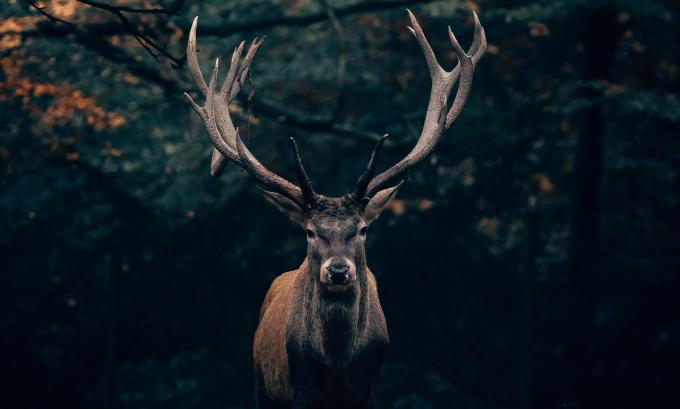
We are delighted to present Sydney Schnepel's story "Deer Crossing Ahead," winner of the David Hamilton Undergraduate Creative Writing Prize. This prize is sponsored by anonymous donors who wish to honor the mentorship and support they and other students at the University of Iowa received from Emeritus Professor of English David Hamilton. In addition to publication online, Schnepel will will be awarded a $500 scholarship. This year's judge was David Hamilton himself.
When it was over, one of its heels was stuck in the windshield. The other sparkled pink in the middle of the highway. I found the deer lying on the side of the road, looking dead. I put it in the backseat with its heels and drove it home. I cleaned it up in the bathtub and left it on my bed until I could bury it.
When I came inside for a break from digging, it was baking a carrot cake. It apologized and asked if it was alright if it used the kitchen. I said yes, that was fine. I asked why it was wearing my clothes. It said it already had someone’s shoes, but nothing else, and it had wanted so badly to try on some clothes. I promised it wasn’t a big deal. I never wore that dress. It wanted to stay awhile and help out around the house to repay me for saving its life. I told it that was fine. I slept on the couch and it took the bed.
In the morning it had an elaborate breakfast laid out on the kitchen table. After we ate, it got my daughter ready and drove her to school. It returned with shopping bags and apologized for using my credit card. I said I didn't mind if it got what it needed. It told me it had rented a car in my name and dropped mine off for repairs. I thanked it and apologized for not having more time to chat. I had to get to work.
I couldn’t write, listening to it constantly working. It cooked three meals a day, and dessert. It cleaned the house from attic to basement. It redecorated the guest room. It called all my extended family to chat. I often heard it talking to my daughter, and I got emails from the school. She had stopped having behavior problems. She was the best reader in her class and was tutoring the other kids. She had been recruited for the middle school basketball team and the high school volleyball team, even though she was not quite ten. I asked her what they had been working on together, but she didn’t want to talk to me. It didn’t matter. I could spend more time with her in the summer. Now I had time to work.
One morning I found it in my office, at my computer. It said it was almost done with another chapter of my novel. I said it should have asked before it touched my writing. It hadn't had the experiences the novel was about, of growing up as myself, getting an MFA in fiction, almost having affairs. It apologized. I said it could continue if it wanted to. The novel was done within a week. Most of the parts I had written were edited out.
Soon my name was on the news next to a picture of it in makeup and some silver earrings that had belonged to my grandmother. I was a famous writer. My novel won every prize there was, even the ones that aren't for literature. My mother was interviewed on the news. She said she could barely recognize me, I had gotten my act together so well. It invited her and Dad over for dinner, and made salad, corn on the cob, and blackberry pie. My parents told it they were so proud of it for doing what they had thought was impossible: my daughter was being raised into a fine young woman, I was a success, and the house looked great.
I said: “Stop talking to that thing. I'm your daughter.”
They didn't seem to hear me. They asked if it would like to go with them on a trip to Europe.
As it cleaned the kitchen after they left, I asked if it was difficult keeping up with all the work. It said it was a pleasure. I asked how it was able to get so much done. It told me it was only doing what it thought everyone did. I wanted to know if it missed where it used to live. It didn't. I asked where it had lived. In a little meadow off the highway, it said, and in a throng of trees nearby on a farmer's property. The grass is rich, the farmer spills plenty of corn, and herds gather there, if you want to join. I said, I might try it out for a while. Would you mind staying here and taking care of things? It said it would love to.
Now I live my life free, on all fours, mostly eating grass. Although I did have a close encounter once as I crawled across the highway. I stopped and stared at a car. I thought I recognized it, but I couldn't be sure from where. The headlights were too bright.
Sydney Schnepel is a neurodivergent writer. She is currently working on a fabulist young adult novel, and enjoys writing short fiction and essay on disability, mental health, and literature. She can be reached at sydneyschnepelwriter@gmail.com.
